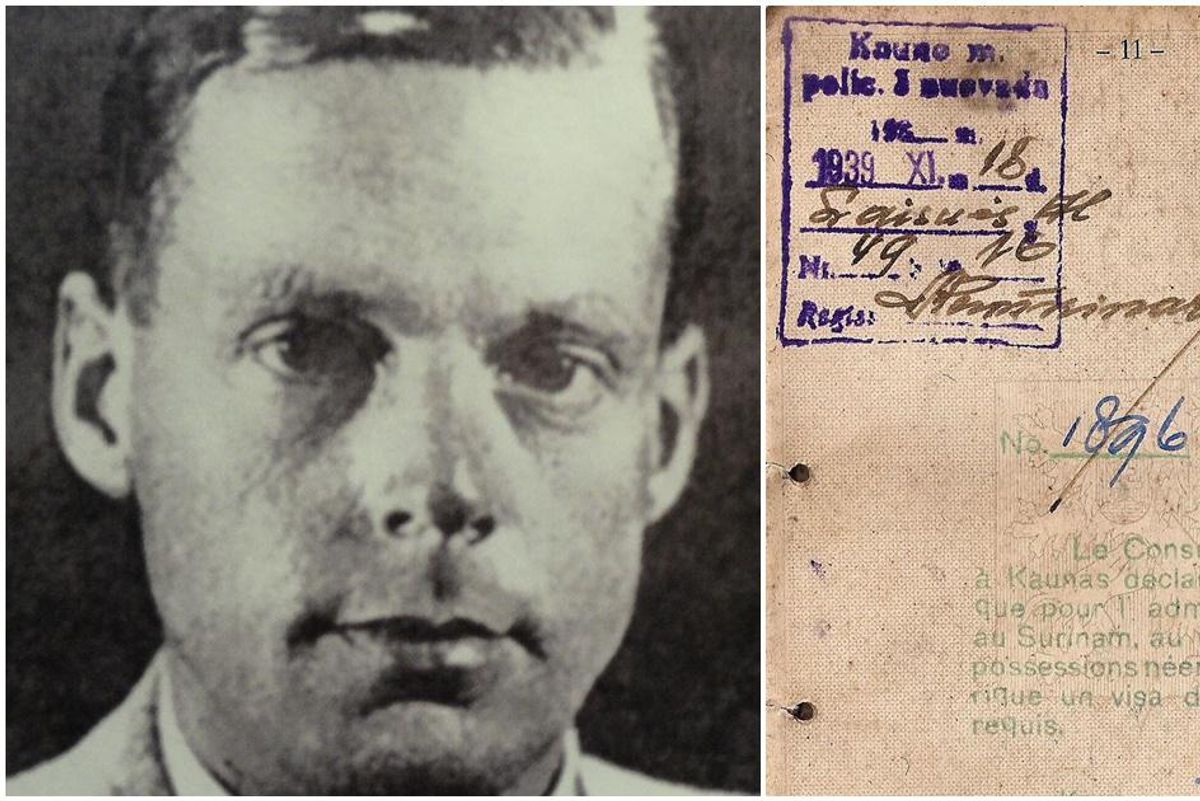
When ordinary people who have no intentions of making history step up to do the right thing, it reminds us that we all have the ability to be heroes. Jan Zwartendijk, a company man who risked the life of his wife and three children to help Jewish people flee to freedom during World War II, is finally getting his due after becoming the subject of a biography, “The Just: How Six Unlikely Heroes Saved Thousands of Jews from the Holocaust.”
The book was written by celebrated Dutch author Jan Brokken and first published in Dutch in 2018. It’s now available in its English-language translation.
When World War II broke out in Europe, Zwartendijk, originally from the Netherlands, was the head of a Philips branch in Kaunas, Lithuania.
The Dutch company Philips sold light bulbs, gramophones and radios, and because of his reputation for being reliable, Zwartendijk was asked by the Dutch government in exile to take on the unpaid position of consul in Kaunas. The Netherlands had been invaded by the Nazis in 1940.
In June 1940, the Soviet army invaded Lithuania. Fearing persecution, Jewish refugees who fled to Lithuania began looking for a way out of the country. After he was approached by a few refugees, Zwartendijk concocted a secret plan to help them escape Europe.
In doing so, he put the lives of himself and his family in tremendous danger.
Zwartendijk could help them out of Lithuania by giving them passage to the Dutch Caribbean island of Curaçao, about 5600 miles away. He did so by writing on their passports that no travel document was required to travel to Curaçao.
This was half true. Travel to Curaçao was allowed but required permission from the tiny island’s governor. However, the island was so remote, Zwartendijk thought that no one would bother to check the country’s entry requirements, and they didn’t.
The Curaçao visas allowed the refugees to petition Soviet authorities for transit papers. They were also able to take the visas up the road to Japanese diplomat Chiune Sugihara. Sugihara then cleared the way for the refugees to escape Europe by traveling to Vladivostok, a port city in Russia, via the Trans-Siberian Railway, and from there, by boat to Japan.
From Japan, they could travel freely to the Western Hemisphere, until December 7, 1941.
After the Jewish refugee community learned that Zwartendijk was issuing visas that allowed them to flee, they began to frantically line up at his office looking for “Mister Radio Philips.” Over a two-week period from July 26 and August 2, 1940, Zwartendijk churned out at least 2,345 visas and Sugihara issued close to 2,000.

A Curaçao visa issued by Zwartendijk.via Wikimedia Commons
On August 3, the Soviets closed the embassies and consulates in Kaunas.
Researchers estimate that the work of the two men allowed somewhere between 6,000 to 10,000 refugees to escape Europe because the visas were usually issued to men who brought their wives and children along for the journey.
Zwartendijk left Lithuania in September 1940 and returned to the Netherlands where he remained quiet about the work he did during the war. In 1964, after reports of the “Angel of Curaçao” emerged, he was reprimanded by the Dutch foreign ministry.
For the rest of his life, Zwartendijk wondered what happened to the refugees he helped flee Europe. He feared that many didn’t make it past Siberia.
“He must have thought that most of these people perished. He must have been worried that he sent them to their deaths,” his son, Rob Zwartendijk, told The Guardian.
Researchers later determined that 95% of the Jewish refugees with Zwartendijk’s visas survived the war. Sadly, this information reached his residence on the day of his funeral in 1976.
Over the years, Sugihara would be praised for his actions in Lithuania, while Zwartendijk remained relatively obscure.

Chiune Sugiharavia Wikimedia Commons
Sugihara died in 1986, two years after he was honored as “Righteous Among the Nations”—the greatest award that a non-Jew can be given by the State of Israel. Zwartendijk would receive the award posthumously, in 1997.
When asked about their acts of heroism, both men showed nothing but humility.
“It is the kind of sentiments anyone would have when he actually sees refugees face to face, begging with tears in their eyes,” Sugihara said. “He just cannot help but sympathize with them. Among the refugees were the elderly and women. They were so desperate that they went so far as to kiss my shoes. Yes, I actually witnessed such scenes with my own eyes.”
Zwartendijk’s son recalls his father dismissing any claims that he was a hero. “Ah, that’s not very important, everyone would have done those things if they had been in this position,” he said.
Over the past few years, Zwartendijk has finally been receiving the praise he deserves. After Brokken’s book was published, he received an apology from the Netherlands for chastising him for his work during the war.
The city of Kaunas has honored him with a memorial in front of the Philips office. More than 2,100 passports are suspended between two trees at the location and at night they light up a beautiful array of blue, pink and green.
Good to see the new Jan Zwartendijk lightmonument in Kaunas. As honorary consul he saved numerous Jews by issuing v… https://t.co/8gLK170pma
— PieterJanLangenberg (@PJLangenberg)
1535187640.0
